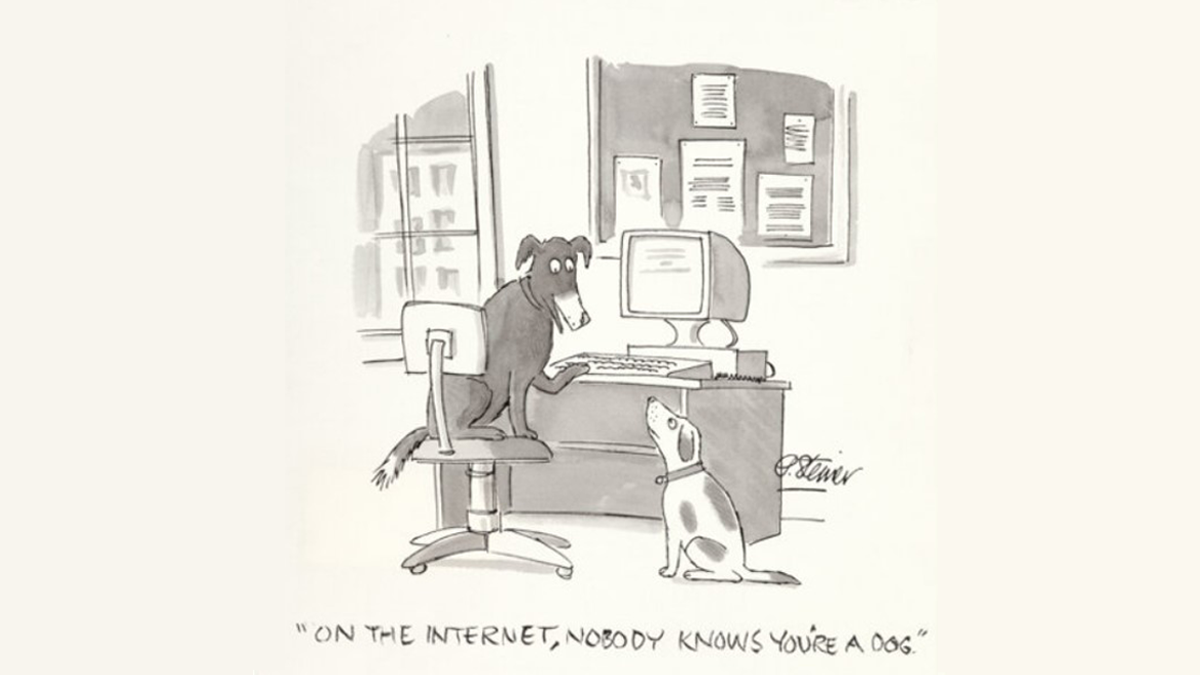In 1993, cartoonist Peter Steiner was at his desk trying to fill out his weekly quota of pitches for the New Yorker. “I didn’t always have enough ideas, so sometimes I would just draw a picture and try to dream up a caption for it,” Steiner said. He sketched out two dogs sitting in front of a computer, one in a chair and one on the floor, and the one-liner popped into his head: “On the internet, nobody knows you’re a dog.” It was a throwaway gag, but Steiner sent it in, and the dogs made the cut. “I was surprised when they picked that one out of the batch,” Steiner said. “I thought it was a little bit lame.”
It didn’t catch fire right away, but since its publication, the cartoon has become one of the most recognizable jokes about the internet, if not technology in general. 30 years later, Cyberdog is the most-shared cartoon in the New Yorker’s century-long history. The original drawing goes up for sale at the Heritage Auctions October 6th Illustration Art Auction on Friday. Heritage expects it to fetch up to $50,000.
“Most people had never even used the internet in 1993. I certainly didn’t have a connection,” said Bob Mankoff, former cartoon editor for the New Yorker. “But I think part of its success comes from the fact that we’re all living in the world that that cartoon foreshadowed. There’s a way that a cartoonist’s antenna can sort of tap into the zeitgeist, and good cartoon compresses the message as simply as possible.”
It’s hard to believe you could make an observation in the early days of such a significant technology that still feels poignant, let alone a joke that still makes people laugh after all that time. But in those seven words, Steiner’s dogs captured one of the key factors that makes the internet so strange, and an element of what’s made the world wide web so significant.
The power of anonymity, especially on an equal playing field like the internet, gives people a voice they might never have otherwise. It’s launched careers, toppled giants, and started movements. Throughout the internet’s history, corporations and governments have fought to take that anonymity away. Just this year, congress is considering a bill called the Kids Online Safety Act (KOSA) that would likely force you to hand over copies of your ID before you read, watch, or post anything online. The battle over anonymity continues, but at least for now, the dogs can still win.
“I’d love to be able to say I saw this coming, but I didn’t,” Steiner said. “But with every new turn it just became more relevant. Now we’re looking at artificial intelligence. AI is like the ultimate internet dog.”
But when you set aside the historical relevance and prescient commentary, Steiner said a lot of what makes the joke work is a formula. It’s the same reason the New Yorker has so many cartoons with kings, or barbarians, or guys on desert islands. It’s the context. “It’s just funny when you have a dog say something that a normal person would say,” Steiner said.

